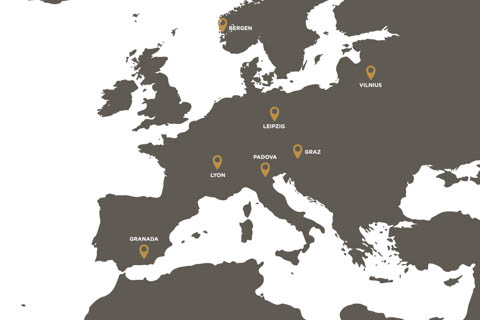 |
Faculty
Economics and Business Administration
|
|

|
Qualification awarded
Master in Business Management |
|

|
Scope of studies and length
120 ECTS credits, 2 years
|
|

|
Application deadline
31st March |
|

|
Language
English
|
|

|
Tuition fee per year
6 000 €
|
|

|
Start of studies
1 September
|
 |
City
Pardubice, Nicosia, Rome, Vilnius
|
APPLY NOW
The area of finance has recently been undergoing fundamental changes. Digital technologies have transformed the economy and society, affecting all sectors of activity including the financial sector. Both consumers and businesses are increasingly using digital financial services. The pandemic has exacerbated this trend. Innovation is ubiquitous in financial services – whether it is mobile banking, e-commerce and contactless payments, or asset management and cryptocurrency trading. Digital finance offers technology companies opportunities to develop and innovate, creating growth and jobs. Data is at the centre of digital transformation. Currently, big data and analytics are top of the list of critical skills shortages.
Sustainable finance is an area that has seen significant growth in recent years. The United Nation’s 2030 Agenda Sustainable Development Goals have become an important reference point and benchmark for policymakers and the private sector. Sustainability refers to humankind meeting its economic needs without overburdening the environment or weakening societies. Sustainable finance covers environmental and social goals, it takes sustainability into account across asset classes and different products and services, ranging from corporate loans to mutual funds with shares of sustainable firms, offered to retail investors.
Lithuania is a dynamic European innovation and fintech hub, having all the necessary conditions for its fintech ecosystem to grow and develop, namely support from the government, favourable taxation system, progressive regulatory rules, multi-disciplinary talent pool, and innovative infrastructure.
Therefore, four partner universities (University of Pardubice (the Czech Republic), European University (Cyprus), LUMSA University (Italy), and Vilnius University (Lithuania)) developed a joint master study programme Financial Data Analytics and Sustainable Finance (FINDATA) that will react to these changes and challenges in the society and economy, and urgent needs of the labour market. FINDATA master study programme aims to educate highly qualified experts in the field of finance and data analytics, i.e., graduates equipped with knowledge of key financial and economic disciplines with emphasis on environmental, social and governance (ESG) considerations. See the website of the FINDATA study programme here
The study programme will offer students two specializations – (1) Corporate Finance and (2) Financial Markets. The specialization of Corporate Finance (LUMSA University) aims to obtain a state-of-the-art understanding of modern corporate finance and to provide in-depth insights into the field of sustainable corporate finance by developing the awareness of the social and environmental impacts and the importance of digital transformation on financial choices to create long term financial benefits. In this specialization, the students will study four compulsory courses. The specialization of Financial Markets (Vilnius University) aims to prepare highly qualified finance specialists with a good understanding of finance and financial markets for sustainable development trained to deal with modern-day financial and economic problems toward a long-term paradigm for sustainable investments.

Programme structure
| Course unit title |
ECTS
credits
|
|---|
| Course unit title |
ECTS
credits
|
|---|
|
1 semester (University of Pardubice)
Compulsory courses
Economics and Financial Aspects of Innovations and Sustainability
Principles of Artificial Intelligence and Machine Learning
Applied Financial Econometrics
EU Law and European Values
Research Methods
Elective courses
Principles of programming for R
International Finance and Macroeconomics
|
30.0
25.0
5.0
5.0
5.0
5.0
5.0
5.0
5.0
5.0
|
|
2 semester (European University Cyprus)
Compulsory courses
Computational Finance
Big Data Analytics in Finance
Elective courses
Machine Learning in Finance
Programming for Python
|
30.0
20.0
10.0
10.0
10.0
10.0
10.0
|
|
3 semester (LUMSA University; specialization Corporate Finance)
Compulsory courses
Innovation in Banking and Fintech
Sustainable Finance and Investments
Advanced Corporate Finance
Ethics and Humanism in Digital Era
Elective courses
Financial Risk Management
Corporate Strategy and Sustainability
|
30.0
26.0
6.0
6.0
8.0
8.0
4.0
4.0
4.0
|
|
3 semester (Vilnius University: specialization Financial Markets)
Compulsory courses
Integrity and Ethics in Finance
Behavioural Finance for Sustainable Development
Technical Analysis of Financial Markets
Investing for Environmental and Social Impact
Financial Technologies and Alternative Investments
Elective courses
Equity Securities
Investment Portfolio Analysis
|
30.0
25.0
5.0
5.0
5.0
5.0
5.0
5.0
5.0
5.0
|
|
4 semester (at the chosen university)
Compulsory courses
Master thesis
|
30.0
30.0
|
Key Learning Outcomes
Graduates will know financial and economic concepts and contexts, and different ways of financing sustainable innovation activities.
Graduates will know new trends in the banking sector and fintech ecosystem.
Graduates will be familiar with the tools, the framework and the strategies of sustainable finance underpinned by social and environmental values.
Graduates will be familiar with the main tools and practices used for the analysis of financial markets and financial risk assessment.
Graduates will understand the strategic role of fintech in addressing the financing challenges of sustainable development.
Graduates will be able to apply technology and data analytics skills to solve accounting and finance problems ethically.
Graduates will be able to perform quantitative and qualitative analysis of economic data and to use information technology and software support for organizational, presentation and analytical work.
Graduates will be able to make complex decisions within the concept of sustainable finance in the digital era.
Programme Specific Requirements
To enter the FINDATA study programme, the candidate must have at least an academic Bachelor degree (minimum of 180 ECTS credits) in either Economics, Finance, Business Administration or similar fields of education, or in IT, Engineering, Technical Science, Mathematics, Physics, Chemistry or similar fields of education with sufficient knowledge of mathematics.
The applicant must have a sufficient level of English of at least B2, or at least 1 academic year of comprehensive English instruction.
The admission procedure is two-round. In the first round, the applicants are ranked on the basis of their results in the previous level of study, motivation (motivation letter) and letters of recommendation. In the second round, the top-ranked students are invited to an online interview.
For more information on the application procedure, click here.
Why choose this programme?
- The FINDATA programme is delivered in English.
- The programme is delivered by 4 partner universities: the University of Pardubice (the Czech Republic), European University (Cyprus), LUMSA University (Italy), and Vilnius University (Lithuania). Therefore, the FINDATA programme is designed to make the best use of the specific expertise available at each partner university.
- Student and staff mobilities are integral parts of the FINDATA programme. Each student must spend a semester at least with 3 out of the 4 partner universities. This enables each student to gain experience in different international environments.
- The study programme will offer students two specializations – (1) Corporate Finance and (2) Financial Markets.
- The FINDATA study programme is staffed by renowned scholars in their fields of research and qualified lecturers, whose diversity of disciplinary interests ensures coherent and varied teaching.
- Collaboration with VU FEBA external partners helps to ensure a high level of research and studies in finance.
- VU FEBA has a Bloomberg LAB – a dedicated computer laboratory empowering researchers, lecturers and students to use the latest data and tools to diagnose and analyse financial markets.
|
What comes after?
- The graduates of the FINDATA study programme will satisfy the demand of employers, especially in the areas of financial markets, commercial banking, central banking, insurance, fintech companies, investment and pension companies and the like.
- The graduates will gain the prerequisites for independent analytical work.
- The graduates will become digital specialists as they will be able to face situations in the field of finance and solve them using current financial and information technologies in various activities of the abovementioned employers.
- Vilnius University has created opportunities for students interested in continuing their education to enter into doctoral studies, which are available in the English language; furthermore, the best of our graduates might be offered employment at the university.
|



